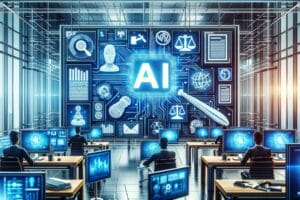News and predictions about the impact that Artificial Intelligence (AI) will have on a legal level are starting to circulate.
In particular, it is about how AI can be used during legal proceedings and court processes.
AI news: Judge Roberts’ predictions
Recently, John Roberts, Chief Justice of the United States Supreme Court, published his year-end report in which he also discussed the role that AI is playing within the legal and judicial system.
In the report, he wrote that the predictions about the future of artificial intelligence are breathtaking, to the point of raising doubts that judges may become obsolete.
According to Roberts, this will not happen, but technological changes will continue to transform their work.
Among the uses of AI that Roberts mentions are facial recognition and voice recognition, and he hypothesizes that according to several law professors, artificial intelligence could achieve very high grades in law school exams, to the point of even surpassing the bar exam.
On the contrary, it even hypothesizes that soon legal research could become unimaginable without the use of AI, especially for its potential to greatly increase access to key information for lawyers.
The flip side of the coin would be the risk of dehumanizing the law.
AI and the law: the latest news and predictions
The judge also emphasizes that AI could greatly help those who, for example, cannot afford a lawyer, in addition to helping answer basic questions such as where to find legal templates and forms, how to fill them out, and where to submit them to the judge. All of this without leaving home.
Therefore, those who could benefit from it the most are mainly beginners, those who have no experience in the legal field, and those who need quick access to legal information.
However, the use of artificial intelligence in the legal field requires caution and humility.
Roberts specifically mentions the case of a so-called “hallucination”, in which some lawyers who have used an AI application to submit briefs ended up citing non-existent cases.
In addition, some jurists have raised concerns about the possibility that AI tools may be fed with confidential information that should not be disclosed. In other issues, there would also be risks regarding privacy.
Finally, Roberts recalls that when judges have to make largely discretionary decisions, there are concerns regarding due process, reliability, and potential biases.
He says:
“At least for now, studies show a persistent public perception of an ‘equity gap between humans and artificial intelligence’, which reflects the belief that human judgments, despite all their flaws, are fairer than anything the machine spits out.”
The problem of judgment
Speaking specifically about judgment, according to Judge Roberts, AI works well when there is precision and lack of discretion, while often judicial decisions instead involve gray areas that still require the application of human judgment.
In other words, machines would not be able to completely replace human professionals precisely because of the judgment skills of the latter.
For judges, nuances matter a lot. For example, when it comes to the reliability of statements from defendants or witnesses, such as a trembling hand, a trembling voice, a change in intonation, a drop of sweat, a moment of hesitation, or a fleeting interruption of eye contact.
Most people still trust humans more than machines to perceive and judge these details correctly.
On the other hand, AI applications can undoubtedly help the judicial system in achieving its goals.
Therefore, it is not about replacing human judgment, but about providing people who have to make it with new tools to make their lives easier, and above all to allow them to express judgments as accurately as possible.
The future
According to Judge Roberts, the evolution of artificial intelligence will force courts to consider its proper use within litigation.
Many judicial committees will be involved, such as those dealing with judicial administration and case management, cybersecurity, and rules of practice and procedure.
Although human judges will continue to exist, judicial work will be significantly influenced by AI.
In addition, the changes that will be made will not only concern the way judges carry out their work, but also the way they will understand the role played by artificial intelligence in the cases presented to them.
The goal should be to achieve increasingly fair, fast, and cost-effective judgments.
More than anything else, AI will probably be used to make processes faster, and therefore less expensive, as well as making access to information easier. The downside will be the increasing risk of obtaining false or incorrect information, especially when using generative artificial intelligence.




















